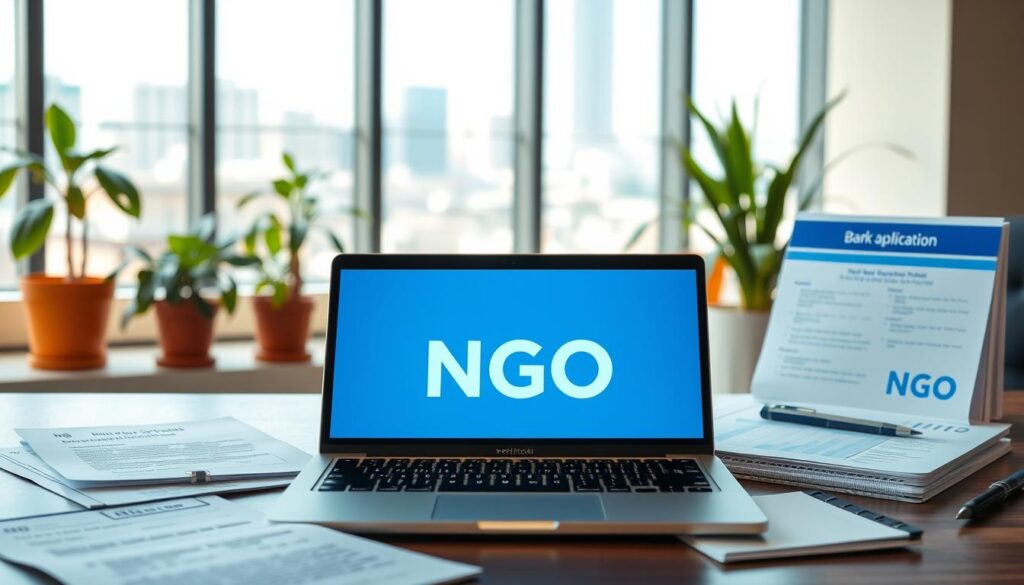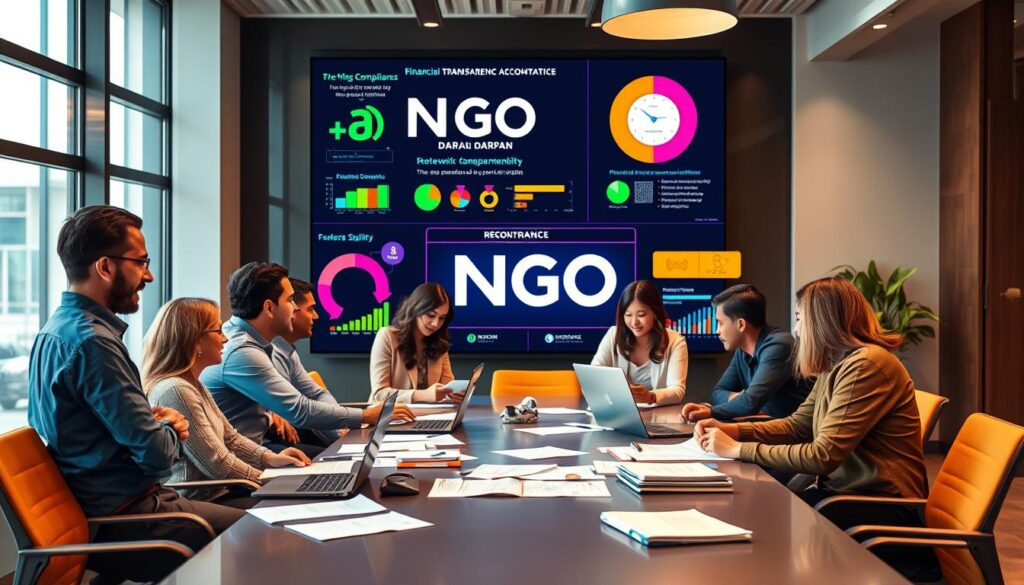In India, non-profit organizations play a big role in social welfare. A new rule in banking has changed how things work. Now, do non-profits need an NGO Darpan registration to keep their bank accounts open?
The Ministry of Finance made a big change on March 7, 2023. It’s about the Prevention of Money-laundering Act (PMLA) Act changes. Banks and financial institutions must make sure every non-profit has a Unique Identification Number from the NGO Darpan portal. This rule was first for groups getting money from abroad or government grants. But now, it covers all groups to fight money laundering.
This change affects how banks see non-profits and how they get their money. It’s important for NGOs to understand NGO Darpan registration and bank account compliance well. This article will help small business owners and professionals in India understand these new rules.
Introduction to NGO Darpan and its KYC Significance
The NGO Darpan was started by Niti Aayog in 2015. It’s a key tool for making non-profit organizations (NPOs) in India more transparent and financially compliant. This database is vital for keeping up with the latest KYC rules for non-profits, helping them meet financial institution standards.

NGO Darpan does more than just register NGOs. It connects them with government agencies, donors, and other stakeholders. This platform makes it easy to see how NGOs work, ensuring they follow financial rules well. This is crucial in today’s world where high standards are expected.
The Evolving Role of NGO Darpan in Financial Compliance
Since starting, NGO Darpan has become a key part of making NGOs financially compliant. It’s not just a place for information; it also checks if NGOs follow financial rules. Keeping the database up to date helps build trust and is important for getting funding.
Understanding KYC Requirements for Non-Profit Organizations
For non-profits, following KYC rules is about being seen as legitimate and transparent. The new KYC rules mean NGOs must update their info regularly. This helps financial institutions and makes sure money flows legally.
| Key Features | Details |
|---|---|
| Launch Year | 2015 |
| Administered by | Niti Aayog |
| Primary Objective | Enhance transparency and accountability in NGO operations |
| Significance | Centralized database for NGO KYC, critical for financial compliance |
| Website | https://ngodarpan.gov.in/ |
Get your NGO Darpan Registration today at Just ₹ 799/- only.
Is NGO Darpan Registration Mandatory for a Bank Account?
The Indian government has made mandatory NGO Darpan registration for bank accounts under the PMLA Act. This move highlights the growing need for KYC compliance for NGOs. It also shows the increased financial institutions’ responsibility to follow these rules.
The NGO Darpan portal, run by the NITI Aayog, gives a unique ID to non-profits. This ID is key for NGOs to do financial transactions and stay transparent. Banks can check if NGOs are real, stopping fraud and making finances safer. This rule means all NGOs must follow strict KYC norms for banking in India.
Here are some key aspects and steps involved with NGO Darpan registration:
- Complete registration by providing NGO/entity details matching the PAN card name.
- Verification via OTP on both registered mobile number and email.
- Eligibility for applying to governmental grants contingent upon obtaining this ID.
NGOs not following this rule might face big problems. They could not open or use bank accounts. This could really hurt their ability to raise money and work.

| Requirement | Details |
|---|---|
| NGO/Entity Name | Must match the NGO’s PAN card name |
| Password Criteria | 6 to 10 characters, including one uppercase letter and one number |
| Mobile Number | Must be 10 digits (exclude ‘0’ or ’91’ prefixes) |
| Verification | OTP validation on both mobile and email |
| Grant Applications | Can be processed online through the DARPAN Portal |
In conclusion, NGO Darpan registration makes NGOs follow KYC rules. This ties them to the rules set by the Indian government. It makes them more accountable and compliant.
Impact of PMLA Act Amendments on NGOs
The recent changes to the Prevention of Money Laundering Act (PMLA) have brought big updates for Non-Profit Organizations (NGOs) in India. These changes, influenced by global standards, make NGOs follow strict rules for financial openness. This ensures they meet national and international anti-money laundering (AML) standards.
Connecting the PMLA Act to NGO Financial Transparency
The PMLA Act updates have made NGOs focus more on financial openness. They must now register on the NGO Darpan portal, a database by NITI Aayog. This makes it easier for regulators to check NGO finances. The goal is to protect against money laundering and terrorist financing.
How NGOs are Affected by Recent Legislative Changes
The new laws have made rules stricter for NGOs. Now, NGOs must reveal who really controls them if they own more than 10%. This means NGOs have to be more open and watchful about their money and rules.
| Aspect | Details | Impact |
|---|---|---|
| Beneficial Ownership | Threshold reduced to 10% for major influence in NGOs | Increases entities under scrutiny, ensuring transparency |
| Registration Requirement | Mandatory registration on NGO Darpan portal | Centralizes NGO data for better regulatory access and compliance checking |
| Reporting Obligations | Enhanced reporting to Financial Intelligence Unit – India (FIU-IND) | Promotes diligent financial activity monitoring and accountability |
| AML Measures for Financial Transactions | Applies to Cryptocurrency and Virtual Digital Assets (VDAs) | Expands the scope of financial surveillance to include emerging digital financial assets |
| Documentation and Data Retention | Banks and financial institutions to maintain NGO transaction records for at least five years | Facilitates thorough investigations and checks on financial discrepancies |
This table shows the main points of the PMLA Act changes for NGOs. It covers the rules and their effects on NGOs in India. The goal is to make NGOs more transparent and follow laws to fight financial crimes.
Why Do Banks Require NGO Darpan ID for KYC?
As rules get stricter under the Prevention of Money-laundering Act (PMLA), banks must follow financial rules closely. This means they need to be more transparent and accountable. Getting an NGO Darpan ID for KYC is now more important than ever.
Ensuring Compliance with Financial Regulations
Putting nonprofits under financial scrutiny helps meet global standards set by the Financial Action Task Force (FATF). Banks ask for the NGO Darpan ID to follow these rules. This helps stop money laundering and fraud. All registered NGOs and NPOs must show their NGO Darpan IDs during KYC checks.
The Consequences of Failing to Provide a Darpan ID
If NGOs and NPOs don’t follow these rules, they face big problems. They might not be able to use banking services. This makes it hard for them to work legally and financially in the country. So, the NGO Darpan ID is key to keeping their money dealings honest.
| Regulation Detail | Implementation by Banks | Consequence for NGOs |
|---|---|---|
| NGOs/NPOs must register on Darpan Portal | Mandatory ID verification during KYC processes | Restricted banking services without ID |
| Records maintained for five years post-relationship | Compliance with section 46A of RBI’s KYC Directions, 2016 | Penalties for unreported or falsified information |
| Applies to all NGOs/NPOs, not just FCRA registered | Verification against centralized NGO Darpan database | Increased scrutiny and reporting requirements |
In short, needing an NGO Darpan ID for KYC is a big deal. It’s not just a rule; it’s key to keeping financial dealings honest for NGOs and NPOs. Not following this can cause big legal and operational issues. So, it’s very important for non-profits to follow these rules in India’s financial world.
Process for Obtaining an NGO Darpan ID for KYC Compliance
NGOs must follow financial rules, making obtaining an NGO Darpan ID crucial. This ID helps with compliance and lets NGOs get funding from institutions. By registering on the NGO Darpan portal, NGOs show they are open and can be checked.
To start, NGOs need to follow a few steps. These steps help prove their trustworthiness. This is important for working with banks and government agencies.
- First, visit the NGO Darpan portal and make an account.
- Then, fill out your organization and personal info.
- Upload important documents like your registration, PAN, and Aadhar cards.
- Use OTPs to check if your info is correct.
- After that, finish the registration to get your NGO Darpan Unique ID.
| Statistics | Details |
|---|---|
| Current NGOs Registered | 205,892 |
| Government Fees | None |
| Improvements Post-Registration | Trustworthiness, credibility, access to grants |
After registering on the NGO Darpan portal, NGOs get many benefits. Their credibility goes up, and applying for grants gets easier. This digital ID also opens doors to more resources and chances for growth.
It’s key for NGOs to keep their KYC compliance process current on the NGO Darpan portal. This avoids funding and operation issues. It also helps NGOs be open, accountable, and sustainable.
Documentation and Registration: Navigating the NGO Darpan Portal
Starting your NGO’s registration journey means you’ll need to use the NGO Darpan portal. You’ll need to gather important documents to make the process smooth and meet financial rules. It’s crucial to know what documents you need and how to use the online guide.
Essential Documents for Successfully Registering Your NGO
Before you start, you’ll need to collect certain documents. These include your NGO’s registration certificate, PAN Cards for key members, and ID documents. It’s important to have accurate and verified documents to avoid delays. The verification process usually takes about a week.
Step-by-Step Guide to the Online Registration Process
First, visit the NGO Darpan portal’s official site and pick the right registration category. Then, fill in your organization’s basic details, making sure they match your legal documents. Finally, upload the required documents. Each step is important to get your Darpan ID, which offers many benefits.
If you’re registering to get foreign funds, you’ll need to follow extra rules like the Foreign Contribution (Regulation) Act. The process makes it easier to follow these rules. Being registered properly helps avoid fraud and opens up more funding and partnership opportunities.
| Registration Document | Information Required | Purpose |
|---|---|---|
| NGO Registration Certificate | Valid Certificate under Societies Act/Trust Act/Section 8 Companies | Verifies the legal identity of the NGO |
| PAN Card of NGO | PAN number of the NGO itself | Account tax filing and financial identification |
| PAN and Aadhar of Executive Members | Required for at least three members | Links responsible members for contact and verification purposes |
| Official Contact Details | Working email and mobile number for OTP verification | Ensures communication for portal access and profile updates |
By following these steps and using the online guide, you can register your NGO successfully on the NGO Darpan portal. This preparation helps you navigate the process better and prepares your NGO for future opportunities and compliance.
Can an NGO Operate Without a Darpan ID in India?
In India, the rules for non-governmental organizations (NGOs) are getting stricter. This includes needing a Darpan ID from the Niti Aayog’s NGO Darpan portal. This ID is key for an NGO’s credibility and legal status. It affects how well they can work and follow the law.
Recently, the rules have changed a lot. NGOs without a Darpan ID face many legal and operational problems. This makes it hard for them to work well in India’s legal system.
Exploring Legal Implications for Non-Registered NGOs
NGOs without a Darpan ID face big legal issues. The latest changes to the Prevention of Money Laundering Act (PMLA) say all non-profits must register on the NGO Darpan portal. This is to make financial dealings clear and follow anti-money laundering rules.
Not following these rules can lead to big problems. NGOs might face fines and have trouble with their money. For example, banks must check if NGOs are registered on Darpan Portal. This makes it hard for NGOs to open or keep bank accounts, which they need for money.
Operational Challenges Faced by Unregistered NGOs
Unregistered NGOs also have big problems besides legal ones. They can’t easily get government money, grants, or foreign help. The Darpan portal is important for getting these resources.
Also, they can’t easily show their work and results. Being registered lets NGOs report their activities and updates. This is important for being open with the public and stakeholders.
The table below shows the main differences between registered and non-registered NGOs:
| Aspect | Registered NGO with Darpan ID | Non-Registered NGO |
|---|---|---|
| Legal Compliance | Meets PMLA and FCRA requirements | Subject to legal penalties and operational restrictions |
| Access to Funding | Eligible for government grants and foreign funding | Limited or no access to structured funding sources |
| Banking Operations | Can open and operate bank accounts smoothly | Challenges in banking access and financial transactions |
| Transparency and Reporting | Enabled through consistent project updates and impact reports | Potentially inadequate reporting leading to reduced trust |
In summary, NGOs without a Darpan ID in India face big legal and operational problems. While it’s technically possible to operate without one, it’s not easy. Following the rules helps NGOs work better and get the resources they need.
Bank Notices to NGOs Regarding Darpan Registration
Recently, banks have sent out bank notices for NGO Darpan registration to all non-profits. These notices stress the importance of following NGO compliance requirements due to new KYC rules. They point out that getting a Darpan ID from the NGO Darpan portal is now a must for banking services.
This move is part of the government’s effort to make NGOs more transparent and efficient. It’s crucial for these groups to grasp the details and value of these rules. This ensures they can keep operating and get the benefits they deserve.
Here’s what NGOs need to do after getting a bank notice for NGO Darpan registration:
- First, understand the notice: It will clearly state the need for Darpan registration and the deadline to avoid banking issues.
- Next, take immediate action: NGOs should quickly go to the NGO Darpan portal to register if they haven’t already.
- Then, prepare documents: Collect the needed papers like PAN, office bearer details, and organizational info as required by NITI Aayog for registration.
Meeting these NGO compliance requirements is more than just a formality. It’s a step towards being more accountable and transparent. By registering on Darpan, NGOs become eligible for government funding. This can greatly help their work and reach.
| Requirement | Details |
|---|---|
| Portal Registration | NGO Darpan portal managed by NITI Aayog |
| Key Documents | PAN, Mobile, and AADHAR numbers essential |
| Functionality | Enables eligibility for government grants and schemes |
| Status Updates | Required to update organizational and contact information annually |
| Grant Eligibility | Registration does not guarantee immediate grants; criteria must be fulfilled |
This move to align with bank notices for NGO Darpan registration highlights the importance of compliance. It ensures NGOs can fully benefit from government support.
Updating KYC for NGOs Using Darpan ID
In today’s world, updating KYC for NGOs with Darpan ID is key. This ID makes it easier to identify and meet financial rules. It’s a must for financial institutions.
How to Link NGO Darpan ID with Bank Accounts
To link NGO Darpan ID with bank accounts, NGOs need a valid Darpan ID. This ID proves they are real and legal. Here’s how to do it:
- Log into the bank portal where the NGO has an account.
- Go to the KYC update section and choose to link Darpan ID.
- Put in the NGO Darpan ID and upload needed documents as the bank asks.
- Send the info and wait for the bank to confirm the update.
This easy link helps with financial dealings and builds trust with banks.
Deadline and Timeline for Submission of Darpan ID
It’s important for NGOs to meet submission deadlines for Darpan ID set by banks. Missing these deadlines can stop banking services. This includes stopping transactions and fund distributions.
Here’s a timeline banks often give for KYC updates:
| Action | Required Documentation | Deadline |
|---|---|---|
| Initial Notification | None | Received upon account opening |
| Submission of Darpan ID | Darpan ID, Registration Certificate, PAN Card | Within 60 days of the notification |
| Confirmation & Verification | Bank’s internal verification | Within 30 days from submission |
Being on time is very important. It keeps bank accounts working and shows the NGO is trustworthy. This is key for future financial dealings and getting government grants.
Benefits of NGO Darpan Registration Beyond KYC Compliance
Getting an NGO Darpan registration does more than just meet KYC needs. It’s a joint effort by NITI Aayog and the National Informatics Centre. It brings many benefits for growth and helping society.
The Role of Darpan ID in Governance and Transparency
Having a Darpan ID is key for NGOs to be seen as trustworthy and transparent. This ID comes with a detailed look at what the NGO does, where it gets its money, and how it’s set up. It helps both the public and government see clearly what the NGO does.
This ID is a sign of trust and realness. It makes the NGO’s governance better.
Access to Government Grants and Schemes for Registered NGOs
Getting government grants and schemes is easier with an NGO Darpan registration. The platform shows all the government programs, like those from the Ministry of Culture and the Ministry of Social Justice and Empowerment. NGOs with a Darpan ID have a big advantage.
| Feature | Details | Impact |
|---|---|---|
| Transparency | Registration mandates detailed disclosure of NGO operations and fund sources. | Enhances trust and credibility with stakeholders and public. |
| Access to Grants | Eligibility for government grants detailed on the Darpan portal. | Opportunity for financial support and expansion of NGO activities. |
| Governance | Upholds stringent governance standards required by key ministries. | Improves managerial practices and compliance with regulatory frameworks. |
The benefits of NGO Darpan registration go beyond just being a KYC tool. It can change how NGOs work and help them make a bigger difference. With more openness, easier access to funding, and better governance, getting a Darpan ID is very important for NGOs in India.
Consequences of Non-Compliance: Can Banks Freeze Accounts?
The NGO Darpan non-compliance penalties have big effects on NGOs in India. They face strict rules to be transparent and accountable. If they don’t follow the rules, their bank accounts might get frozen.
Banks are key in keeping financial deals safe. They check if NGOs are registered with NGO Darpan. If not, they might freeze the accounts.
This strict rule helps protect the financial system. It stops money laundering and terrorism financing. Banks can freeze accounts if NGOs don’t show a valid Darpan ID.
- Ensuring all branches comply with the PML Act/Rules.
- Regular updates and reviews of the KYC/AML/CFT policies.
- Mandatory training for staff on compliance measures.
| Issue | Consequence |
|---|---|
| Missing NGO Darpan ID | Potential freezing of bank accounts |
| Non-adherence to updated KYC norms | Investigation and delayed transactions |
| Failure to maintain minimum balance as mandated by banks | Quarterly fees and potential account closure |
| Inactivity in accounts for over a year | Account status changed to dormant, freezing of funds |
NGOs must know the risks of bank account freezing for NGOs. They need to register with NGO Darpan and keep records up to date. This helps them avoid legal issues and stay operational in India.
Conclusion
The importance of NGO Darpan registration is huge in today’s financial world. It’s key for maintaining NGO bank accounts and following the law. To register, you need to gather important documents like a PAN card and proof of your work.
So far, about 251,356 NGOs have joined the Darpan scheme. This makes it even more important to register. Not registering can lead to legal action for non-submission of Darpan ID. This could freeze your bank accounts and stop your work.
Understanding the Darpan portal is crucial for NGOs. It helps them stay credible, get financial benefits, and qualify for tax breaks. As more government departments join, NGOs will have more chances to get funding. This is good for their work and makes them more accountable.
FAQ
Q: Is NGO Darpan registration mandatory for all types of non-profit organizations?
Q: Why do banks require NGO Darpan ID for KYC?
Q: What is the process for obtaining an NGO Darpan ID for KYC compliance?
Q: What documents are required for NGO Darpan registration?
Q: Can an NGO operate without a Darpan ID in India?
Q: How does NGO Darpan ID impact bank account KYC for NGOs?
Q: Are NGOs required to submit Darpan ID for existing bank accounts?
Q: What benefits does NGO Darpan registration offer beyond KYC compliance?
Q: What are the consequences of non-compliance with Darpan ID requirements?
Q: How can an NGO check if it is registered on the NGO Darpan portal?
Q: Is there a deadline for NGOs to submit Darpan ID to banks?
Q: Can banks freeze accounts without NGO Darpan ID?
Q: Is NGO Darpan registration applicable to charitable trusts?
Q: What should NGOs do after receiving a bank notice for Darpan ID?
Please Rate this post
Click to rate












